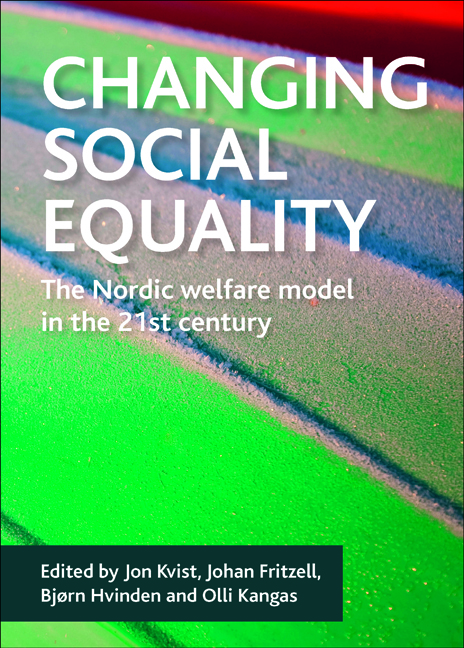Book contents
- Frontmatter
- Contents
- List of tables and figures
- Notes on contributors
- Acknowledgements
- one Changing social inequality and the Nordic welfare model
- two Anti-immigration attitudes, support for redistribution and party choice in Europe
- three Do we all (dis)like the same welfare state? Configurations of public support for the welfare state in comparative perspective
- four Eroding minimum income protection in the Nordic countries? Reassessing the Nordic model of social assistance
- five Equality in the social service state: Nordic childcare models in comparative perspective
- six Welfare state institutions, unemployment and poverty: comparative analysis of unemployment benefits and labour market participation in 15 European Union countries
- seven Social inequalities in health: the Nordic welfare state in a comparative context
- eight Income inequality and poverty: do the Nordic countries still constitute a family of their own?
- nine Is immigration challenging the economic sustainability of the Nordic welfare model?
- ten Nordic responses to rising inequalities: still pursuing a distinct path or joining the rest?
- Index
seven - Social inequalities in health: the Nordic welfare state in a comparative context
Published online by Cambridge University Press: 01 September 2022
- Frontmatter
- Contents
- List of tables and figures
- Notes on contributors
- Acknowledgements
- one Changing social inequality and the Nordic welfare model
- two Anti-immigration attitudes, support for redistribution and party choice in Europe
- three Do we all (dis)like the same welfare state? Configurations of public support for the welfare state in comparative perspective
- four Eroding minimum income protection in the Nordic countries? Reassessing the Nordic model of social assistance
- five Equality in the social service state: Nordic childcare models in comparative perspective
- six Welfare state institutions, unemployment and poverty: comparative analysis of unemployment benefits and labour market participation in 15 European Union countries
- seven Social inequalities in health: the Nordic welfare state in a comparative context
- eight Income inequality and poverty: do the Nordic countries still constitute a family of their own?
- nine Is immigration challenging the economic sustainability of the Nordic welfare model?
- ten Nordic responses to rising inequalities: still pursuing a distinct path or joining the rest?
- Index
Summary
Introduction
It is now widely acknowledged that welfare states are important determinants of health as they mediate the extent, and impact, of socioeconomic position on health (Navarro et al, 2003, 2006; Bambra, 2006a; Chung and Muntaner, 2007; Eikemo et al, 2008a). Welfare state provision varies extensively, but typologies have been put forward to categorise them into three, four or even five distinctive types or welfare state regimes (see Chapter 1). The concept of welfare state regimes has been used to analyse cross-national differences in population health. These studies have almost invariably concluded that population health is enhanced by the relatively generous and universal welfare provision of the Nordic countries, especially when contrasted to the Liberal welfare states of the UK and Ireland (Navarro et al, 2003, 2006; Coburn, 2004; Bambra, 2006a). In contrast to their comparatively strong performance in terms of overall health, data from a number of comparative European research projects suggest that the Nordic welfare states do not have the smallest health inequalities (Lundberg and Lahelma, 2001; Dahl et al, 2006). However, the position of the most vulnerable social groups is often much better in the Nordic welfare states (Zambon et al, 2006; Avendano et al, 2009; Dahl et al, 2010), and health inequalities in the Nordic countries have remained fairly stable (Lahelma et al, 2002) while they have widened in other countries, such as the US (Krieger et al, 2008) and New Zealand (Blakely et al, 2008), during the more volatile economic and political climate since the 1980s and 1990s. There is tentative evidence from the experiences of other countries to suggest that future changes – such as marketisation and individualisation – in the Nordic welfare model may also increase health inequalities and damage the position of the most vulnerable in the medium to long term. This chapter critically overviews the comparative evidence base on health inequalities in order to place the Nordic welfare states within their international context.
Initially, the chapter examines health inequality – definition, measurement and theory. It then examines the role of welfare states in determining overall population health outcomes. The main studies in the comparative epidemiological literature on European health inequalities are then summarised (Mackenbach et al, 1997, 2008; Cavelaars et al, 1998), with a focus on the relative performance of the Nordic welfare states.
- Type
- Chapter
- Information
- Changing Social EqualityThe Nordic Welfare Model in the 21st Century, pp. 143 - 164Publisher: Bristol University PressPrint publication year: 2011



